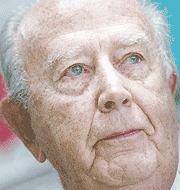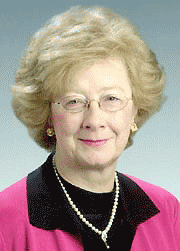|
||||||
Comptrolling MarylandDemocratic primary voters likely to define image — and substanceby Sandra Olivetti Martin
No matter who we hire as our comptroller, the bottom line won’t change. You’ll still have to pay taxes: income tax, sales tax, corporate tax, gasoline tax, alcohol tax, cigarette tax. It’s the extras — from the style with which the job’s done to the alignment of votes on the state’s three big-money boards — that will change. Comptroller is a job most Marylanders define by style. The style was set by the venerable Louis Goldstein. In his 40 years comptrolling, he became Mr. Maryland, part Uncle Sam, part Santa Claus. William Donald Schaefer, 84, — Baltimore’s mayor, Maryland’s governor, Goldstein’s two-term successor — has replaced Santa Claus with W.C. Fields, adding showmanship, comedy and political incorrectness to the image. It’s that latter quality, the outrageous remarks that only a comedian can get away with, that may give a new image to an old job. Democratic voters in the September 12 primary have two choices for redefining the comptroller’s image. Contender Janet Owens, 62-year-old, two-term Anne Arundel County executive, would play a good Mrs. Maryland. Matronly, mannered, managerial and mild, she speaks hardly a discouraging word, shocking this reporter with her admission that she was “pissed off” at allegations against her by the third Democratic contender, Peter Franchot. “I think people vote for dignity,” she said. Peter Franchot, 20-year delegate to the Maryland General Assembly from Montgomery County, is the youngest of the three at 59, and he seems a young rebel storming the gates of power. It’s an image he’s honed. Four decades ago, Franchot dropped out of Amherst to help Gene McCarthy push Lyndon Johnson out of the presidency. The job is way more than image. Ninety percent of Maryland’s revenues come through the comptroller’s office. The bulldog tenacity that makes for efficient tax collection is staff work, says Schaefer who inherited Goldstein’s 1,100-person staff. “Their mission is to collect taxes,” he told Bay Weekly. “If you owe them money, they go after you.” As well as collecting taxes, there’s balancing the state’s books and paying its bills. It’s in those areas where Janet Owens makes her case. “I’ve learned in these eight years of dealing with revenue caps and being in crisis all the time that I like managing things,” she told Bay Weekly. “People want somebody with management experience to handle their money.” Franchot’s political experience has been in the legislature, where he’s established a green record that includes authoring a constitutional amendment that gives you a say on the November ballot as to whether a governor can sell park land without the approval of the legislature. As the subcommittee chair on environment and transportation in the appropriations committee, he’s inundated yearly with money matters. Maryland’s comptroller also casts a decisive vote on three powerful boards: Board of Retirement and Pension Systems, the Board of Revenue Estimates and the Board of Public Works. It’s the Board of Public Works, which reviews all state contracts over $200,000, where William Donald Schaefer has gotten himself in trouble for Fieldian remarks. Schaefer’s commentary from the Board troubles both challengers equally and helped propel both — both former Schaefer allies — into the race. The business of the board — which is composed of governor and treasurer as well as comptroller — is where Franchot makes his case as an activist protector of the public interest who would be both check and balance and a promoter of sustainable policies. He has won the endorsement of The Maryland League of Conservation Voters. “I am a progressive Democrat in favor of an educated workforce, Program Open Space and a cleaner, more mobile state using mass transit,” says Franchot, who charges both his Democratic opponents with Bob Ehrlich values and intimacy with developers. |
||||||
|
|
||||||
|
© COPYRIGHT 2004 by New Bay Enterprises, Inc. All rights reserved. |
||||||





